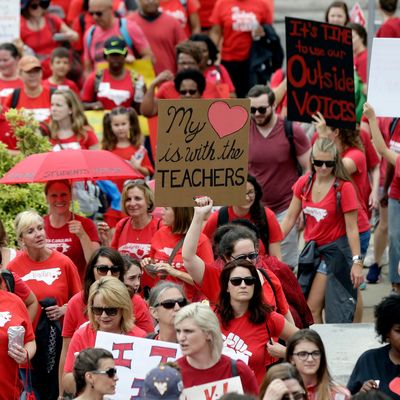
The protests that erupted earlier in West Virginia, Kentucky, Oklahoma, Arizona, and Colorado have now spread to a state where demonstrations against conservative governance are common: the very purple state of North Carolina. Thousands of teachers marched on the state capitol (which with a capacity of 3,000 people had to turn some of them away) to demand greater education funding and fewer tax cuts from the GOP-controlled legislature.
Teacher pay was among the items on their wish list (North Carolina is 37th in average teacher pay, and some districts are experiencing teacher shortages), and at the moment Republicans are supporting a pay raise that is significantly lower than the one being proposed by Democratic governor Roy Cooper. But the real focus of the protests is on the conservative legislature’s fiscal priorities, in which public education is often an after-thought despite its dominant position in the state budget. One protest leader explained the problem to NBC News, alluding to the state’s history as a regional leader in education:
“We have not had a textbook adoption in 15 years,” said Mark Jewell, president of the North Carolina Association of Educators, a professional group for the state’s teachers. “We have school districts deciding whether or not to pay the light bill or buy toilet paper. We have classrooms … that are 35 students and higher in some instances. This is not normal. This is not the North Carolina way.”
North Carolina is a right-to-work state that bans public employee strikes and does not provide for collective bargaining for teachers. So teachers seeking better pay and more funding have no choice but to pressure legislators and threaten consequences at the polls if they refuse to listen. Moreover, they’ve had to take personal leave days to march on the capitol. Participation in the protests expose some political and cultural divisions in the state, as The Wall Street Journal observes:
The districts that canceled class, affecting nearly one million students, are concentrated in the state’s urban and suburban counties, while most of the state’s 100 counties are rural and their school districts will be open.
That divergence isn’t a coincidence, and reflects the growing divide in the state between the liberal cities that drive the state’s economy and the conservative small towns and rural areas that control state politics.
The split is unsurprisingly reflected in partisan positions on the protests:
The state Democratic Party made a promise to invest in schools the first plank in its new policy platform. Many urban Democratic legislators have said they intend to go “RedforEd,” donning red T-shirts and marching alongside teachers.
In contrast, the state Republican Party said the protest is wrongheaded and unnecessarily inconveniencing parents and students. The state GOP is renting an indoor bounce-house park Wednesday and inviting children to play for free on the unexpected day off.
Everyone agrees the protests are meant to kick off a drive to affect legislative elections in November.
Terry Stoops, a former public-school teacher who researches education for Raleigh’s libertarian-leaning John Locke Foundation, said the North Carolina rally is different from those in other states because it is unlikely to change public policy.
“People will harden their positions,” Mr. Stoops said. “The real motive here is to replace the Republican majority in the General Assembly.”
With the school year coming to a close soon in much of the country, the current remarkable wave of teacher protests will reach at least a temporary lull as well. But protest leaders agreed that the ballot box was the next step for teachers, who are undertaking a “six-month strategy” to influence public opinion in the lead-in to the general election. They will certainly have allies in other states.






























